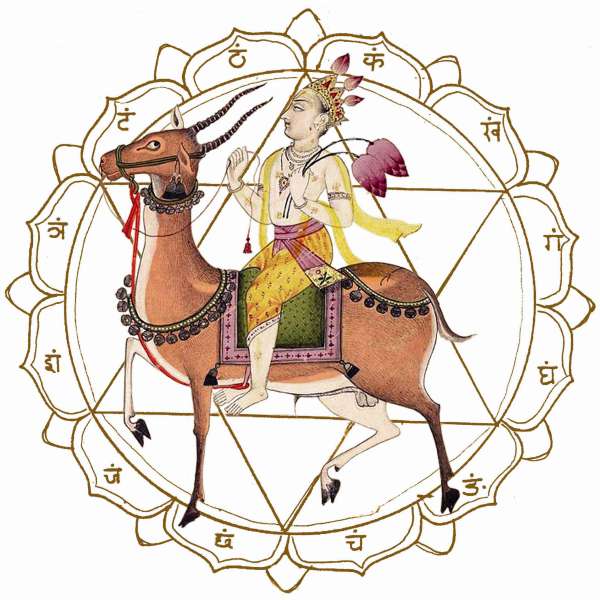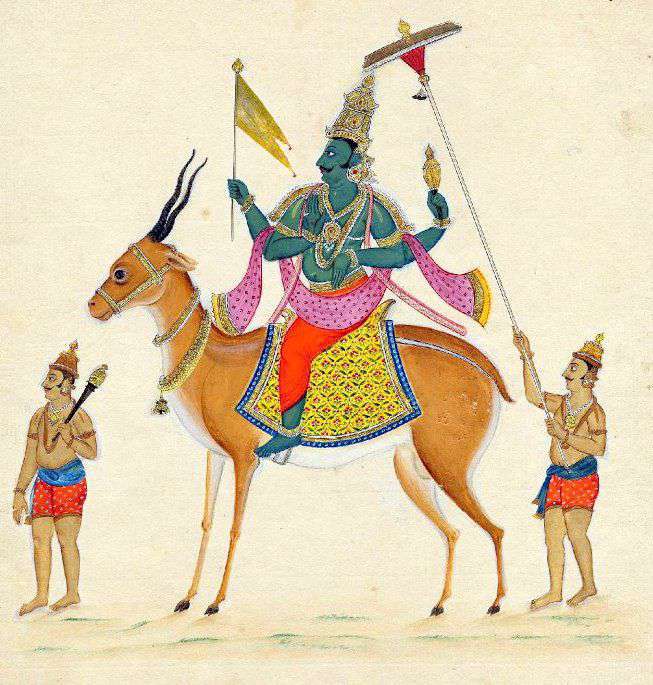No products in the cart.
Vayu is the Hindu deity of wind. He was the father of the great Pandava Bheema. Bheema’s mother Kunti, who had the boon of having children with any god she pleased with, once prayed to Lord Vayu for a son. Lord Vayu granted her wish and she gave birth to a boy who was immensely powerful and strong. He would go on to become the strongest of the Pandavas and play a pivotal role in their victory over the Kauravas.
Lord Vayu was also the spiritual father of Lord Hanuman. Once when Hanuman was a small child, he thought of the sun to be a fruit. So, he tried to eat the sun itself. Seeing his actions, the gods got very scared, and thought that he was a demon. Lord Indra, furious with his antics, attacked him with his vajra, the strongest weapon there is. The vajra ended up hitting Hanuman, and he became unconscious and started falling down to the earth.
Just at that moment, Vayu caught Hanuman and carried him to a safe place. Seeing the atrocities done on his son by the gods, Vayu got so angry that he stopped the supply of air and wind in the universe, to avenge his son. This resulted in animals and humans both getting suffocated, and on the brink of death. The gods, being helpless in this situation, went to Lord Brahma and told him the whole incident.
Brahma, along with the other gods, went to Lord Vayu and requested him to let go of the air supply, so that everyone could breathe again. He also cured Hanuman. Finally, after a lot of persuading, Vayu allowed air to flow in the universe again, and things were back to the way they were. Hanuman was also granted many boons by the various gods present there. He grew up to become the strongest and the most learned in the entire universe, and helped Lord Ram defeat Ravan and win back his wife Sita. Sometimes, Hanuman is also known as Vayuputra, as he is Lord Vayu’s son.
In the early Vedic times, Lord Vayu was much respected and revered by the people, as he was a part of the holy triad, along with Varuna and Agni. He roamed all over the universe, and was the guardian of the north-west direction. He was a violent god, who did not think twice before causing destructive acts, and had a very bad temper all the time. He is also said to be the king and supreme rulers of the Gandharvas, the celestial beings who live in the forests. He also ruled over the spirits of the mountains who dwell in the foothills of the mountain Meru, a mythical mountain that exists in old legends.
Once Vayu had attacked Mount Meru and broken off its summit. According to legend, once Narada Muni instigated Vayu to break off the top of Mount Meru. Vayu, being the short tempered and violent god he is, started hitting the top with ferocious gushes of wind and tornado that went on for a year. Garuda, the king of the eagles and the mount of Lord Vishnu, ably protected the top of the mountain by spreading his wings and taking the brunt of Vayu’s force.
After one year of this happening, Garuda got tired and relaxed from his post for a while. Narada saw this as the perfect opportunity, and asked Lord Vayu to hit the summit with double his might. This time, Lord Vayu was successful in hitting the top and ripping it off. Vayu then threw the top in the sea, and it became the island of Lanka (present day Sri Lanka).
Lord Vayu was known for his lustful character. Even though he was married to the daughter of Vishwakarma, the architect of the gods, he had affairs with many prominent female characters in Indian mythology over the years. His most famous offspring was Hanuman, the greatest devotee of Lord Ram, an incarnation of Lord Vishnu. Vayu is credited for being responsible for Hanuman having the ability to fly. It is also said that once Vayu tried to seduce all the hundred daughters of King Kusanabha, who refused his advances. This enraged him, and he cursed them to have crooked backs.
Lord Vayu’s adobe is said to be a mythical place which goes by the name of Gandhavati. His weapon is the flag, and his consort are Bharti and Swasti. His mount is the deer or gazelle, which he is often seen riding in ancient Hindu scriptures and paintings. It is said that he chose the deer as his mount, or vahana because of the deer’s agility and swiftness, which matched with his powers.
The Vayu Purana is an ancient Hindu religious text, which is dedicated to the god of wind, Vayu. It is a Shaiva Purana, and contains about 24,000 hymns and shlokas in the praise of Vayu. The Vayu Purana talks about various topics, like the creation and recreation of the universe, the measurement of time and the origin of Agni, Varuna, and other gods. It also talks about daityas, rakshasas, gandharvas, and other celestial beings.
The Vayu Purana has information about the earth being divided into seven dweepas, and further being divided into the varshas. It has names and accounts of the seven ancient netherworlds, or patalas. It has description of the four yugas and the movement of celestial bodies and it also talks about the solar system. The Vayu Purana also contains chapters on music, yoga, and the duties of people belonging to different castes.
In Hindu hymns and scriptures, Vayu is mentioned to be extremely beautiful, who makes a lot of noise as he moves in his bright shiny coach, driven by either two or forty nine or one thousand white and purple horses. His main attribute is a white flag. He is said to be powerful, heroic, violent and a destroyer, just like the other atmospheric deities.
He is also mentioned numerous times in the Upanishads. The Upanishads have many statements and incidents that talk about the greatness of Lord Vayu. The Brhadaranyaka talks about an interesting incident which happened a long time ago. Once all the gods who control bodily functions took part in a competition to determine who among them was the strongest and most important.
One by one all the deities left the body of man, but he continued to live on. The god of vision left his body, and man became blind. But he continued to live on, even though he couldn’t see. The god of hearing left man’s body, but he continued to live on. He couldn’t hear anything, but still lived.
Finally, when Mukhya Prana, or Lord Vayu started leaving the body, all other gods could feel themselves being uncontrollably being pulled from their respective posts. This made them realize that they could only function properly with the help of Lord Vayu, who supplied the air in the body of man.
Vayu is said to travel with Lord Vishnu and his consort, Lord Lakshmi, wherever they used to travel. Vayu, the god of the wind, is extremely important for the sustenance of life, as no life can survive and grow without Lord Vayu’s blessings.







